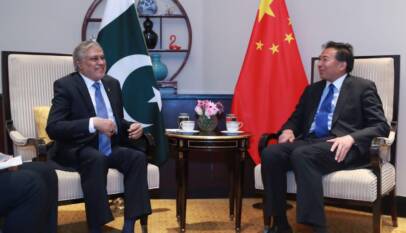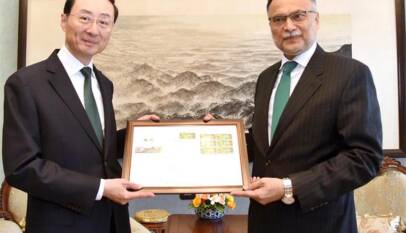CPEC’s second Phase: good omen for fast-track development
Dr. Mehmood Ul Hassan Khan, an academic and analyst, writes that Pakistan has begun a new journey of rapid development under the second phase of CPEC. He highlights that PM Shehbaz Sharif is committed to giving the CPEC a fresh lease on life. Sino-Pak ties are once again on a roller coaster, which is a good sign for both brotherly countries. The appointment of Ahsan Iqbal as Pakistan’s new Minister for Planning and Development by PM Shehbaz is a positive sign for the CPEC’s development. In his article, Dr. Khan adds that the Chinese have great hopes as well as high expectations. Minister Ahsan Iqbal instructed the CPEC Joint Working Groups (JWG) to pursue their sector-specific initiatives and begin work on them as soon as possible. Dr. Khan suggests that in the sphere of CPEC Phase-II, the new government should focus on huge green industrialization, agro-economy, climate change, and biodiversity. Moreover, the right mix of public-private partnerships, including domestic banking and financial institutions, will boost FDI in CPEC projects.
China Pakistan Economic Corridor (CPEC) has now entered into a new phase of rapid development in the country. It seems that the change of gears in the policy making and decision making have once again put the CPEC and Pak-China bilateral relations on the roll coaster which is good omen for both the countries and their people alike.
In this regard, rigorous mutual consultations, collaborations and coordination at the highest political, diplomatic, official, bureaucratic and last but not least, ministerial levels have been kicked off between the two brotherly countries for the further development of CPEC. Even serious meetings have been held for the early start of its phase-II in the country.
In the past, the newly elected Prime Minister Shehbaz Sharif played a key role in setting up many energy and infrastructure projects in the CPEC’s initial stages, and definitely resuming work on the scheme will be like a homecoming. Sharif as the former chief minister of Punjab province was deeply involved in negotiating infrastructure projects built during the early harvest phase of the 15-year CPEC scheme. He has now been dubbed as strategic value-addition for the rapid development of the CPEC especially, initiation of CPEC Phase-II in the country.
During his maiden speech Shehbaz Sharif the primer made clear his intention to breathe new life into the estimated US$60 billion CPEC. It was no coincidence that a Chinese embassy delegation was among the first callers on Sharif when he attended his first day in the Prime Minister Office. Even Chinese foreign ministry spokesman Zhao Lijian termed the premiership of Sharif as positive for the development of CPEC and of course further strengthening of bilateral relations between the two countries.
Unfortunately, the pace and productivity of the CPEC projects could not be up to the mark because of numerous but complex and complicated reasons during the previous government in the country. In this connection, Beijing and the Pakistan establishment conveyed serious concerns to ousted Prime Minister Imran Khan and his PTI-led government which never embraced the CPEC during its three and a half-year rule.
Resultantly, most under-construction projects fell far behind schedule, while no new major projects were launched in the country. The establishment of three special economic zones during the previous government has not yet received any substantial attention from the Chinese businesses looking to relocate their manufacturing facilities. The response from Chinese firms was underwhelming, because of having no clarity of purpose and mechanism of implementation in which even the CPEC Authority also played an unproductive role which seemingly is going to be wrapped-up very soon.
Rather, Chinese diplomats and executives became increasingly vocal in their complaints about red tape holding back private and CPEC projects alike.
Actually, they were disturbed by undue bureaucratic bottlenecks preventing the payment of hundreds of millions of dollars owed to the state-owned enterprises which operate the power generation plants built during former Nawaz’s government. Unfortunately, the tragic incident of killing of its nationals working for the China Gezhouba Group Corp on Dasu hydropower angered the Chinese policy makers and afterwards, comfort zones of mutual trust and promise of so-called immaculate security have been eroded.
It proved fatal for the development of the CPEC project in the country. Despite the Khan administration’s best efforts, China did not make funding available for a US$6.8 billion overhaul of Pakistan’s crumbling railways network.
It is hoped that the leadership of Sharif will be instrumental in accelerating the work on the CPEC. The hopes of the Chinese are quite high as are the expectations. Shehbaz has become Pakistan’s prime minister amid the rolling out of the second phase of the CPEC.
Furthermore, eventually troubleshooting some of the problems that Chinese companies operating in Pakistan have faced in the past few years will be amicably settled and resolved.
In this context, inaugurating a metro bus line connecting Islamabad with its new Chinese-built international airport on Monday, Shehbaz publicly appealed to President Xi Jinping to fund the revival of a mass transit railway system in the populous port city of Karachi by adding the project to the CPEC.
For the easy and smooth sailing of the CPEC project the Prime Minister Shehbaz’s appointed Ahsan Iqbal as the Minister for Planning and Development which would be a good omen for the development of CPEC. He had good working relations with Chinese officials when he held the post between 2015 and 2018, and experienced the implementation of the early harvest phase of the CPEC on behalf of the Nawaz administration.
In this connection, the newly appointed minister for Planning Development and Special Initiatives Ahsan Iqbal termed the CPEC a top priority however expressed serious concern over the sluggish progress on CPEC-related projects.
While attending the maiden review briefing meeting the minister showed displeasure over the waste of time and resources over the last four years on CPEC projects. The meeting was attended by secretaries of various ministries.
The minister directed that progress on CPEC should be reviewed twice a month and all Joint Working Groups (JWG) of CPEC to pursue their sector-specific projects and initiate work on them immediately, the Planning Commission said in a statement.
The minister labeled the CPEC as a potential game-changer for the regions but showed serious concerns about zero progress on the Industrial Zones of Port Qasim, Islamabad and Mirpur which is unfortunate.
In 2017, the excitement around SEZs was so high that all major foreign direct investors were lining up to be a part of it. However, due to an inordinate delay in projects Chinese investors moved away, said the minister.
The minister noted that further delay in projects will not be acceptable and directed the officials to expedite the work. As per the initial CPEC plan, the SEZs were supposed to be ready by 2020 but unfortunately, in the last four years, there has been zero progress on SEZs, said the minister, adding that the Interior Division should ensure foolproof security of the Chinese nationals working in Pakistan.
To conclude, speedy revival of CPEC should be the mantra of the newly formed government in which burning issues of security, delay in payments, incidents of mismanagement and overlapping of bureaucracy should also be plugged-in as soon as possible.
In this connection, Pakistan’s paradigm shift from geopolitics to geo-economic should be transmitted and translated in true letter and spirit. Early initiation of the CPEC Phase-II is the need of the hour. Ideal combination of public-private partnership by involving even the domestic banking & financial institutes would stimulate FDI in the CPEC projects.
It is suggested that new government should focus on massive green industrialization, agro-economy, innovative service sector, climate change and biodiversity, water conservation, de desertizacion, multi-cropping, hydro-energy, artificial intelligence technologies, health and last but not least education in the sphere of CPEC Phase-II.
Diversification of commercial diplomacy and connectivity options is the way forward in which even reformation and reaffirmation of diplomatic ties with ASEAN would be a value addition for the rapid development of CPEC.
Ambassador Zaidong highlights China’s embrace of innovation for sustainable development in Pakistan partnership
In recent months, the term “new quality productive forces” has sparked intense discussions…












